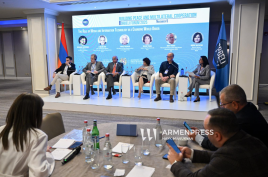Orbeli Forum 2025: AI Impact, Combating Fake News Discussed at Expert Panel
Wednesday, November 5, 2025
The Orbeli Forum 2025 hosted a panel discussion titled The Role of Media and Information Technology in a Changing World Order.
International experts discussed the role of media in the context of AI’s impact, as well as strategies for combating disinformation.
The panel discussion was moderated by Narine Nazaryan, Director of the Armenpress News Agency.
The panel featured Hovhannes Movsisyan, Director of Armenian Public Television; Leonard Novy (Germany), Director of the Institute for Media and Communications Policy; Pankaj Pachauri (India), journalist and former Communications Adviser to the Indian Prime Minister's Office under Manmohan Singh; Barçın Yinanç (Türkiye), journalist and foreign policy analyst; and Scott Fisher (USA), Assistant Professor of Security Studies at New Jersey City University.
Armenpress Director Narine Nazaryan, in her speech, emphasized the pivotal role of the media in peacebuilding processes.
“I consider it highly important and extremely responsible that the panel discussion dedicated to the role of media and information technologies is the final, concluding one,” Nazaryan noted. “Throughout these two days, experts, policymakers, and officials have spoken about peacebuilding and multilateral cooperation, presenting their visions and practical steps. Yet, how these policies and actions reach every citizen largely depends on the crucial role of the media.”
Leonard Novy said that information is of vital importance for democracy and social development.
“All this is taking place under the influence of numerous technological factors,” he said. “People very often no longer trust journalism, and political actors sometimes turn the media into a tool of authoritarianism. We are witnessing the end of an era that we have known until now as classical journalism, and today it may take on a completely new form.”
He emphasized that the spread of artificial intelligence and the concentration of media in the hands of large corporations pose a threat to information diversity and public trust.
Pankaj Pachauri emphasized that a new reality has emerged in the information sphere, comparable to the climate crisis.
“Today, there is not only an information industry but also a disinformation industry. A single meme or a short video can cause significant harm to public consciousness. Information pollution is just as dangerous as air pollution,” he emphasized. According to him, the widespread use of social media complicates the processes of verifying information. “Every day, more than 300 billion emails are sent worldwide, and about 2.5 billion Facebook posts are made. More than half of humanity actively uses social media, which places a great responsibility on media companies and journalists,” he concluded.
The participants of the discussion shared their observations on the future of media, emphasizing the importance of international cooperation, the development of media literacy, and technological ethics in the context of combating disinformation and social polarization.
In the context of combating fake news, Nazaryan highlighted that every journalist ought to serve as a “media peacekeeper” in their mission.
Nazaryan emphasized that the Republic of Armenia places great importance on the need for the institutional implementation of strategic communication. She highlighted that a position of Head of the Strategic Communication Department has been established within the Prime Minister’s Office of Armenia.
“The fight against disinformation is being placed on a solid foundation, as the state views external manipulations and hybrid warfare in general as a security issue. It should be noted that the Government of Armenia collaborates with the international organization NewsGuard in fact-checking and identifying sources of false information. An interesting indicator is that, just this year, 18 cases of externally influenced disinformation have already been recorded, spreading across various social media platforms, and some Armenian websites even republished them,” said Narine Nazaryan.
In this context, Nazaryan noted that enhancing resilience, taking preventive and preemptive measures, and providing expert, evidence-based rebuttals are of vital importance. “At the state level, these measures can succeed if they are combined with the efforts of civil society. In the fight against disinformation, hybrid warfare, and the challenges arising in the age of user-generated media, traditional and reputable media face the task of remembering that the golden rule of medicine—‘Do no harm’—applies equally to journalism. Every journalist, in their own capacity, must act as a ‘media peacekeeper,’” concluded Narine Nazaryan.
Published by Armenpress, original at https://armenpress.am/en/article/1234206





